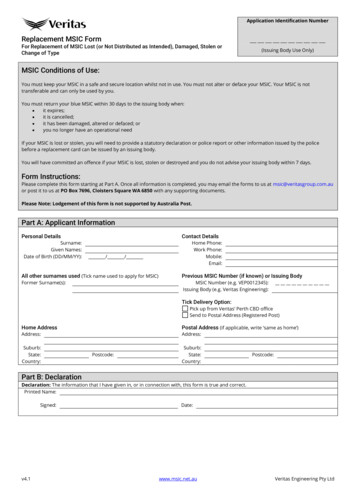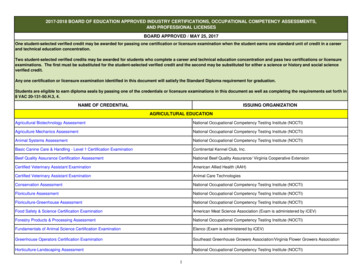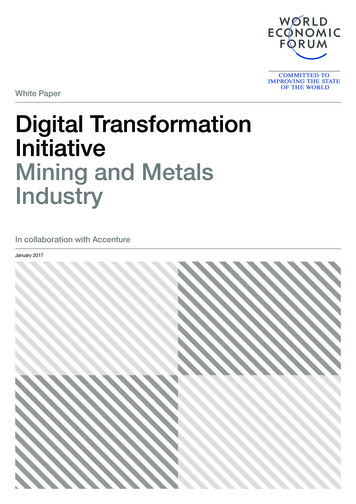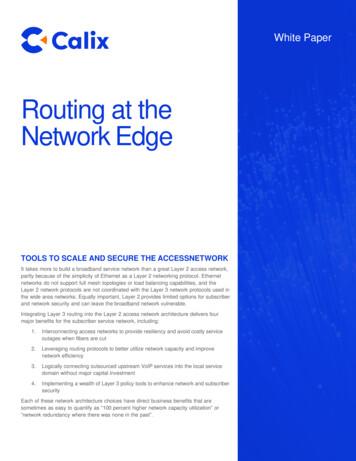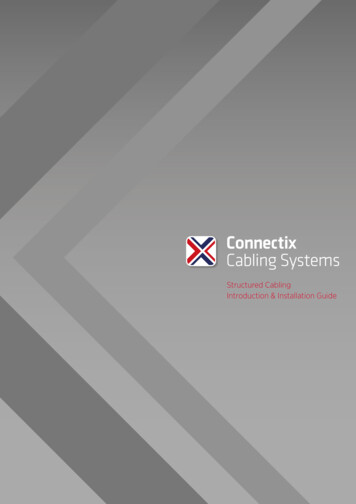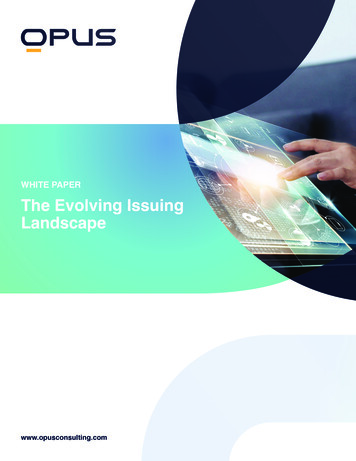
Transcription
WHITE PAPERThe Evolving IssuingLandscapewww.opusconsulting.com
Table of ContentsPageVirtual Cards04The “Buy Now Pay Later” Option04Multi-currency Cards05Tokenization05Instant Issuance05Multi-function contactless cards06Spend Controls06Technology Efficiencies06Conclusions07
Abstract:Emerging Fintechs and agility offered by new technologies have been the key drivers for innovation in the financial services industry, particularly cardsand payments. Innovation is leading to ground-breaking changes in the way customers make paymentsin a seamless, convenient, and secure way.As the industry continues to evolve and mature, let us analyze the new ecosystem that has paved the way for world-class experiences in these newmodes of commerce.Until recently, cash ruled, but the growing popularity of digital payment methods have led to a drastic shift in consumers’ outlook towards convenience.Moreover, the recent unprecedented pandemic of Covid-19 has pushed consumers to avoid handing out cash and choose digital means for makingpayments – for big and small purchases. With people not going out as often as they would pre-Covid, the demand for e-Commerce is surging,whichhas boosted the adoption of digital payments. In 2020, we see a new set of alternative cashless payment methods growingglobally andcapitalizing on the huge market opportunity. Mobile and QR payments, contactless cards, and digital wallets are going to become more significantthan ever. Real-Time Payments is also becoming increasingly popular and has grown to become a critical feature for customer experienceoffered by most banks and FIs.A large share of non-cash transactions still belongs to credit and debit cards. Cards make shoppingfast and easy, and consumers are normally offereda host of complimentary perks such as cash back, loyalty points, and merchant rewards. Mobile applications also allow consumers to save their carddetails so they can shop without having to worry about carrying physical cards.It is not uncommon tosee cardholders use their smartphones’ built-inlocation services to restrict use to a specific geographic area or even help them receive and redeem merchant rewards in real time. Consumers havegrown accus tomed to managing their finances online, and digitization of cards will have the potential to bring new levels of control, functional ity andsecurity to these essential financial tools.Issuers that provide standard card management features in today’s evolving times need to step up. The coming months and years will see issuersexplore innovative ways of integrating card spend data and processes into existing accounts receivable, accounts payable, and accounting platformsand workflows.Commercial cards can prove to be valuable tools for end-user organizations and current market trends suggest that their use willcontinue to grow.03www.opusconsulting.com
Virtual CardsSubstituting the very familiar plastic card with an e-card that can simplify online payments. The use of Virtual Cards for onlinepayments protects the details of your primary card and can provide replacement for single and recurring use. Virtual cards grantconsumersadded control, such as spend limits, forced end dates, and merchant locking.It is not uncommon for consumers toown multiple virtual cards with flexibility to set spend limits on each of them, without having to worry about a merchant overchargingthem. Freezing or deleting a virtual card is at the consumer’s convenience and if something goes wrong, it is takencare of right away.There are significant efforts being made to streamline the overallvalue virtual cards can offer. North America holds a dominant share ofthe global virtual cards market because of the significant growth of market leaders and early adoption of the technology. 1The industryis expected to grow to 2T by 2022 and we are excited to witness the rapid adoption of B2B Virtual Cards, B2C Remote PaymentVirtual Cards, and B2C POS Virtual Cards.The “Buy Now Pay Later” OptionShoppers in some countries notice a new way of paying which isneither a bank card nor store credit. Quick, convenient - BuyNow Pay Later. This is the newest entrant that could prove to a suitable alternative to the traditional credit card.The BNPLoption, as it is popularly called, allows customers to either delay the paymentfor the entire bill amount, or split the cost into equalinstalments.Millennials prefer this option compared to using cards and,toengage with their customers better, banks are nowoffering cardholders a separate Pay Later option that lets them access 45 days digital credit with just a click. Customers can paytheir bills, shop online and make payments to any merchant easily and instantly. Pay Later is being made available as an optionin internet banking and mobile banking.The BNPLservice is growing globally and that could easily translate into increased usage, if more consumers are exposed. Visaannounced the launch of Visa Installment Solutions, which enables active issuers and merchants to give Visa cardholders moreauthority over how goods are paid. 2In 2020,Visa will pilot the solution in the U.S., India, Romania, Russia, and the UAE, andeventually expand to the rest of the world.Just 45 percent of debit card holders have been offered installment payment plans online and 28 percent while at retail stores,according to recent research. Credit card holders are even less familiar with BNPL services, with only 17 percent being offeredsuch options. This represents a massive userbase that could be convinced to adopt BNPL payment plans, with 51 percent ofcredit card holders accepting installment plans when offered them.3Issuers will win in a big way as they roll out the BNPL options to consumersas they already trust them with their products and theongoing relationship between them brings a sense of comfort and familiarity.Consumers interact with their issuers often –for accountbalance enquiries, statements, and bill payments. This gives the issuersample opportunity to present and educate consumers abouttheir installment offerings, beforethey complete a transaction at the POS, or later when consumers are managing their cards on apreferred digital channel. It also implies that the issuer has better insights into the customer’s complete financial behavior,comparedto a never-to-be-repeated installment lender relying on limited data.Banks are reconsidering investing in new card platforms, because of the rise of buy-now-pay-later, driven by a huge economicand consumer behavioral shift.04www.opusconsulting.com
Multi-currency CardsGlobal travel was at his highest until Covid-19 hit the world. Though the future of travel appears to be bleak now, industry expertsbelieve the situation will normalize. Growing travel needs have given rise to the need for travelers to make safe and seamlesspayments without having to worry about changing foreign exchange rates and high fees.Issuers must consider issuing cards that can be configured for multiple currencies. Physical and virtual multi-currency cards could begreat differentiators.TokenizationAnother trend that is rapidly beingadopted is that modern tokenization as a more cost-effective (and secure) way to protect andsafeguard sensitive information. Tokenization allows users to store credit card information in mobile wallets, ecommerce solutions andPOS software, to allow the card to be recharged without exposing the original card information.Some examplesof tokenization arewhen businesses keep their “cards on file” for subscription billing and recurring payments, quick checkouts on e-Commerce websitesand for NFC wallets such as Apple Pay and Android Pay.Once the user takes a picture of the card and saves it on their phone, Apple/Android send those details to the issuing bank ornetwork, which encrypts it into randomly generated numbers. This protects the card details stored on the phone from being misused.Modern tokenization solutions are known to ease PCI Compliance by reducing the number of systems that have access to customers’card information.Secure Remote Commerce is another catalyst for enabling one-click checkout when you are making a purchase on a website, mobileapp, or any other digital channel with a card of your choice.Instant IssuanceThe modern payment landscape has paved the way for instantgratification led experiences and it is not extraordinary forconsumers to expect banks to instantly issue a new card. Themigration to EMV card technology and the expectation of beingable to use the card almost immediately are the key drivers forthis. Instant issuance empowers customers with the flexibility toreplace their cards on-demand.Instant card issuance can help issuers increase revenueopportunities, attract and retain customers, improve customersatisfaction, and cross-sell products and services.05www.opusconsulting.com
Multi-function contactless cardsEMV-enabled NFC cards are way safer today and it is becoming increasingly common for contactless cards to be used for seamlesstravel experiences. They can be used at tap-and-go payment terminals as faster travel. Contactless cards improve your customerexperience, as travelers appreciate being able to pay quickly and efficiently.Spend ControlsGiven that debit cards access a cardholder’s bank account information, it is imperative to maintain control. Though EMV has limitedin-store fraud, card-not-present transactions are not completely fraud-proof. Cards are a popular preference to make payments inmost geographies and banks that offer card controls to track card use and monitor spending certainly have an edge for better fraudmanagement.A great trend isallowing cardholders to manage their cards directly from their mobile device. Cardholders can choose to receivereal-time transaction updates toalerts about every purchase made on their card. This will allow cardholders to set spending limits,designate locations for card usage and geographical parameters, and even mobile device proximity can have a significant impact ontheir exposure and vulnerability to both card-present and card-not-present fraud.If a cardholder’s card is compromised, they have the benefit of instant, uninterrupted access to “turn off” their card, both limitingfurther damage to their account balance and the impact on their financial institution.Technology EfficienciesThe rapid adoption of modern technology and infrastructure tools has enabled issuers to build highly configurable solutions,capable of handling a huge volume of transactions while lowering costs, maintaining high availability, and complying with changingregulations.Cloud based card solutions coupled with a modular architecture are the answer to scalability, availability, and performance neededfor mission-critical solutions. It helps you rapidly develop and launch new products to gain an edge over your competition.APIs are fueling rapid innovation with simplified integrations to deliver exemplary experiences and powering modernization of theCards & Payments industry. Issuers can monetize their platform for several out-of-the-box value added offerings for faster processing,reduced fees, personalized offers for consumers, easy card application and issuance, flexibility of payments. Organizationsleveraging APIs the right way can build a robust ecosystem to increase their revenue. Workflows can be simplified using APIs, leadingto a great amount of flexibility06www.opusconsulting.com
later/CONCLUSIONCard solutions with innovative features and flexibilities, coupled with coming-of-age digital capabilities,are imperative to stay relevant and competitive in an evolving marketplace. Issuers need to embraceopen APIs and third-party integration capabilities to tap into great insights about consumer behavior,with an opportunity to offer better products and services.Consumers today are anxious and accustomed to immediate gratification. The only way you will keepthem engaged is with solutions that are convenient, available on-demand, secure and almost instant.About Opus ConsultingOpus Consulting Solutions focuses on shaping the future of paymentstechnology. With experience building highly innovative solutionsand products, we combine our deep technology proficiency withunmatched domain expertise in Payments and Fintech, enabling us todeliver unparalleled quality and value in everything we do. Our teampartners with a diverse global customer base, ranging from start-upsto Fortune 500 financial leaders, all focused on digital transformationand driving innovation in .com
Shoppers in some countries notice a new way of paying which isneither a bank card nor store credit. Quick, convenient - Buy Now Pay Later. This is the newest entrant that could prove to a suitable alternative to the traditional credit card.The BNPL . Opus Consulting Solutions focus

